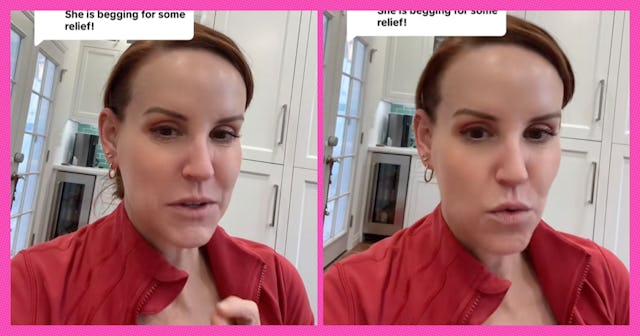Can Tweens and Teens Get Breast Reductions? This Plastic Surgeon Explains
Surgery is not the solution for every person, but it might be right for your teen.

The first girl in your middle school class to get boobs is probably the strongest person you know. Developing earlier and/or larger than other kids your age is not for the weak — the social challenges alone are a minefield. Not to mention the physical toll bigger breasts can take on the body (hello, back pain and feeling semi-suffocated sleeping on your back).
Thankfully, modern medicine has offered a solution to unwanted large breasts: you can simply get rid of ‘em. Three cheers for the breast reduction! But, are breast reductions an option for teens and tweens, who might still be growing?
It turns out, yes. Teens and tweens can get breast reductions, though there are a few factors that surgeons will take into consideration before operating on a young patient. Dr. Kelly Killeen, a plastic surgeon known for her role on E!’s Dr. 90210 revival, explained how she decides whether to perform a breast reduction for a teen on her TikTok account.
First, Killeen said that surgeons will take into consideration the length of time since the teen’s first period, and whether their breasts are still growing.
“They've looked at this in studies, and if you are two three years out from your first period, you should be relatively stable with your size, and it can be a good time to have surgery,” she said.
However, not all breasts stop growing in that time frame. Generally, she explained, surgeons will recommend waiting until the breasts are stable in size before performing a reduction.
There are exceptions, however, such as gigantomastia, a condition characterized by rapid, disproportionate breast growth. In this instance, size can play a role in a surgeon’s decision to perform a breast reduction.
“We sometimes will intervene early when the criteria aren't met for breast size becoming stable when the child's breast size is so enormous, it's really impeding their ability to function and wear clothing,” Killeen explained.
Finally, Killeen said, she tries to ensure that the young patient and their families fully understand the surgery and its potential long-term effects (like the potential inability to breastfeed). The decision to get a breast reduction can be complicated, and the process will look a little different for everyone, so Killeen says that fully preparing the patient is most important so they can make the best choice for themselves.
“These young people can be very tormented psychologically. They can be harmed physically, and can have a lot of pain in their neck and their back,” Killeen said. “So we want to make the right decision at the right time, and there's no like perfect algorithm for every patient. It's a really individual thing.”
Commenters thanked Killeen for spreading her knowledge, but one common issue caught her attention: a few users shared that they had tried, or were currently trying, to get a breast reduction, and surgeons had refused them because, “What would their future husband think?”
“Future relationships should never matter, just the patients desires,” Killeen responded to one user.
I will paraphrase in a less professional tone: Girl, find a new doctor.